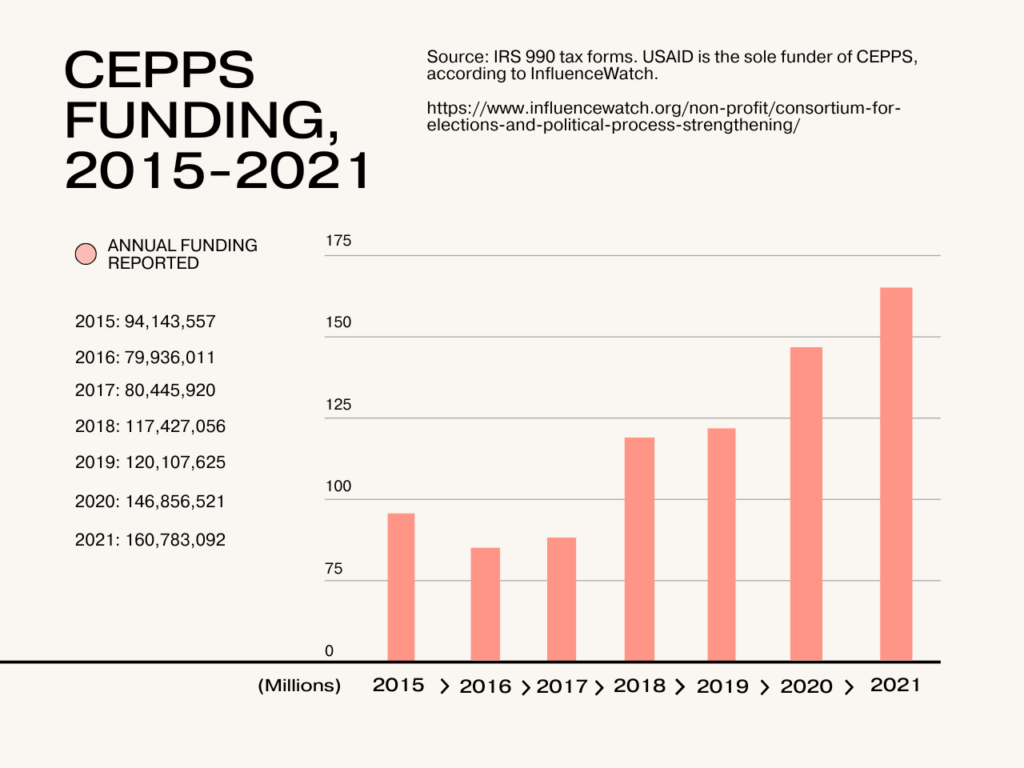USAID Funneled Nearly $800 Million To ‘Gender Transformative’ Global Censorship Group
America’s foreign aid agency, USAID, has given nearly $800 million to a group that has pushed censorship and suppressed “heteronormativity” across the globe, according to documents reviewed by The Federalist.
The Consortium for Elections and Political Process Strengthening (CEPPS) took in $799.7 million in funding from 2015 to 2021, per IRS tax documents. According to InfluenceWatch, “The organization is solely funded by the U.S. Agency for International Development (USAID).”
As President Donald Trump pushes to “wind down” USAID — which has apparently become a massive “scam on U.S. taxpayers” — government funding disclosures have brought to light the often frivolous, and in this case nefarious, use of public tax dollars. As The Federalist previously reported, the federal government has been bankrolling America’s legacy media outlets for years with tens of millions of dollars in lucrative contracts.
CEPPS — whose website is no longer public — claims to be a “nonpartisan” group focused on global “democratic development,” according to an archived webpage. But its website suggests that, while corporate media have been pushing propaganda domestically, CEPPS has been advancing censorship — and radical gender ideology — throughout the rest of the world.
The Money Trail
CEPPS was funded by USAID’s “Global Elections and Political Transitions” award from 2016 to 2020, according to InfluenceWatch. After that award was discontinued in 2022, USAID gave the group a “Democratic Elections and Political Processes award” for another five years.
CEPPS’s online IRS documents only show the group’s funding up until 2021, so The Federalist analyzed the group’s funding based on that publicly available information. The group received more than $94.1 million in 2015 — eventually reaching nearly $160.8 million in 2021, for a total of $799,699,782 in federal funding over seven years. Interestingly, in these documents, the group does not report the salaries of top officials.

CEPPS annual funding from 2015 to 2021. IRS 990 tax forms
CEPPS divided the federal funding between its three member groups — the International Foundation for Electoral Systems (IFES), the International Republican Institute (IRI), and the National Democratic Institute (NDI). The group has worked with “partners” in 140 countries and has observed elections in 40 countries.
Pushing to Censor Disapproved Speech
CEPPS launched a “Countering Disinformation Guide” in April 2021 “with funding from USAID” for use by “practitioners, donors, political leaders, and civil society organizations around the world, to highlight the work being done to counter disinformation.”
Jerry Lavery, then-technical director of CEPPS (and now regional coordinator for Southern and East Africa at the USAID Bureau for Democracy, Human Rights, and Governance), said in an online launch event that IFES, IRI, and NDI “contributed” to the speech control project. He said USAID’s “Global Elections and Political Transitions Award” “funded this important activity,” which would “update over time.”
“CEPPS developed the guide as a living project designed to empower partners around the world to learn from each other the best ways to counter disinformation, no matter who they are — governments, donors, implementers, candidates, civil society, media, or elections management bodies,” Lavery said. “Disinformation challenges to democracy require that we work together as a community to share our experiences, and to hold governments, social media platforms, and political leaders accountable. …”
Lavery introduced David Black, a senior official at USAID, during the video. Black said that “the guide will be an important tool for those who are working to counter these negative impacts of disinformation.” He said, “For a while now,” USAID and CEPPS have been working to silence speech deemed “disinformation” — using an “evidence base” of which programs are effective, “programming in the field to counter disinformation,” and a “disinformation primer for USAID staff and others.”
Black said CEPPS’s guide will be “very useful to USAID staff,” as well as “other donors, aid organizations, partner governments, civil society organizations, and others.”
The “countering disinformation” platform is no longer public, but an archived webpage says the platform featured nine main categories. These included “legal and regulatory responses” to “inhibit political actors from using disinformation,” “platform specific engagement” to leverage “social media policies and enforcement actions,” and the “gender dimensions of disinformation” that provide a framework for silencing “gendered disinformation” that promotes “heteronormativity.”
The platform listed “legal and regulatory responses” to disapproved speech. It suggested countries could “criminalize the dissemination of fake news or disinformation,” though it cautioned doing so, citing the “potential for democratically damaging downstream results.”
The “countering disinformation” platform gave more favorable treatment to approaches that infringed on speech in less direct ways. When “party members or supporters share bad information,” it said, one response could be to force “parties and candidates to issue corrections.” It referenced South Africa — a current human rights nightmare — as an example of a country where “the Election Commission can compel parties and candidates to correct electoral disinformation.” It also said countries could “hold platforms liable for all content and require removal of content,” pointing to online content laws in Germany, France, and the United Kingdom.
CEPPS’s Countering Disinformation Guide included a “global database of organizations, projects, and donors working on and supporting these efforts” to suppress disapproved speech. It featured a menu with groups explicitly focused on censorship, like NewsGuard and the Global Disinformation Index — which attempted to defund conservative outlets, including The Federalist. The Federalist, The Daily Wire, and the state of Texas sued the State Department, which was funding the GDI, for First Amendment violations.
CEPP’s platform included a GDI profile (last updated in February 2021) that glowingly portrays GDI’s “aims to disrupt, defund and down-rank disinformation sites.”
‘Gender Transformative and Intersectional’ Strategy
While CEPPS was pushing to silence unapproved speech, it was advancing an “inclusive development approach” — one “that is gender transformative and intersectional,” according to an archived webpage.
The group planned to “remove systemic inequities and discriminatory norms” worldwide. To do so, it would “dismantle systems of discrimination” and “use political organizing and collective action” to “influence political processes and outcomes.” CEPPS aimed to “challenge heteronormative values and assumptions” and “create an enabling environment supportive of the full inclusion and participation of LGBTQI+ people.”
CEPPS highlighted its “Global Pride” work, including “Trans Queens Of The Night” in Guatemala and “LGBTI rights” groups in Burma, Lebanon, Serbia, and Haiti. The group celebrated “Global Pride Month” in 2021, 2022, and 2023 in joint statements with USAID — one of which promoted CEPPS’s censorship platform.
A document by USAID and CEPPS outlined “Effective Lesbian, Gay, Bisexual, Transgender, Queer, and Intersex+ (LGBTQI+) Democracy and Governance Programming.” It defined gender as the “socially constructed characteristics and related roles, rights, responsibilities, entitlements, and obligations associated with men and women.”
While defining “intersectionality,” the groups adopted the Marxist framework that “racism, sexism, and homophobia” work together to “create systems of oppression that reflects the intersection of multiple forms of discrimination.”
Part of CEPPS’s work includes mitigating what it has deemed “online violence” — not just to women, but, again, to “gender-diverse individuals.” It takes issue with “gendered commentary” and “harassment.”
“Perpetrators of online violence against women and technology-facilitated gender-based violence (GBV) exacerbate existing harmful gender norms and inequalities, enforce heteronormativity, increase social intolerance, and deepen existing societal cleavages,” the archived webpage reads.
CEPPS suggested guides on “the gender dimensions of disinformation,” “men, power, and politics,” and “addressing online misogyny and gendered disinformation.”
Billionaire Elon Musk, heading up Trump’s efforts in the Department of Government Efficiency (DOGE), responded to an X post that used CEPPS as an example of how USAID shuttles money to different actors.
“Exactly,” Musk wrote. “The money laundering is done through several intermediaries.”
Logan Washburn is a staff writer covering election integrity. He is a spring 2025 fellow of The College Fix. He graduated from Hillsdale College, served as Christopher Rufo’s editorial assistant, and has bylines in The Wall Street Journal, The Tennessean, and The Daily Caller. Logan is from Central Oregon but now lives in rural Michigan.




